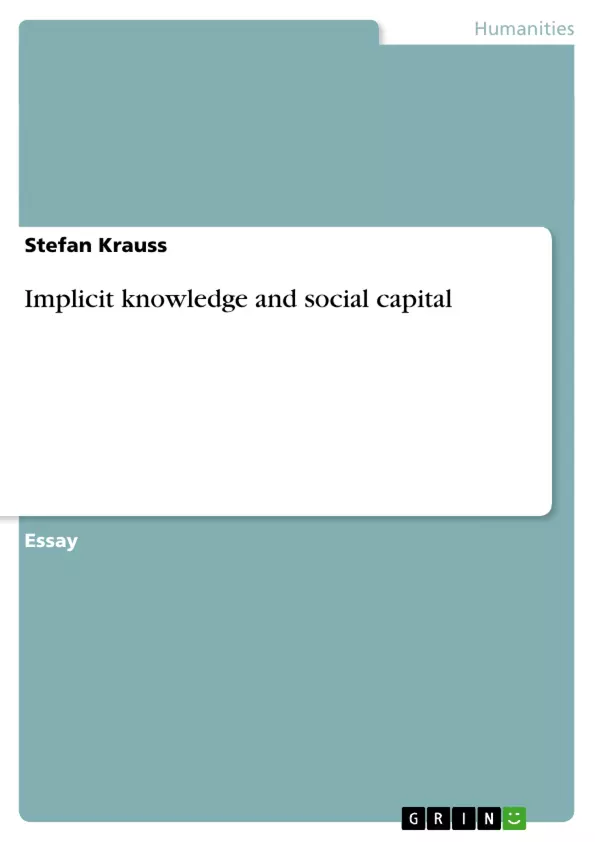The Brundtland report introduced in the 1980's the terminus Sustainability. In this term there is obviously much more included as simply eco friendly or environmentally sound. In the first instance, the term focuses on the discussion about the dealing with resources for the following generations. The popular three-pillar model of
sustainability illuminates that the idea of sustainability orientates besides on ecological as well on economical and on social criteria. Obviously, the former on environmental-ecological issues restricted theme is widened on social concerns. This paper focuses on the social sphere of sustainability. The participation in the net of social relations is the wholeness of the actual and potential resources and is called social capital (Bourdieu 1992). A developed social capital is needed to make a 'strong' democracy (Barber 1984) work; a form of democracy that involves extending and enriching the present system of representative democracy through participation of interested citizens in the policy making process, strengthening a culture of deliberation and discussion, such that politics is seen as a communal learning process rather than a rivalry between fixed interests. It will be shown t hat the relationships between people are the bearer of social capital.
These relationships, the core of the social, are formed by non-explicit knowledge. Non-explicit knowledge is widely accepted as a matter of course however, in it's meaning strongly underestimated. So, this paper starts with a classic of implicit knowledge (? 1) and continues by widening this concept into the social sphere (? 2). Finally, it brings
together the concept of non-explicit knowledge with social capital and stresses its importance for sustainability (? 3).
Inhaltsverzeichnis (Table of Contents)
- INTRODUCTION
- CLASSIC: IMPLICIT KNOWLEDGE BY MICHAEL POLANYI
- CONTINUATION: VIEWPOINTS OF SELECTED SOCIAL THEORIES
- CONCLUSION: SOCIAL CAPITAL AND IMPLICIT KNOWLEDGE
- REFERENCES
Zielsetzung und Themenschwerpunkte (Objectives and Key Themes)
This essay explores the significance of implicit knowledge in shaping social capital and its implications for sustainability. It aims to demonstrate how implicit knowledge, often underestimated, forms the foundation of social interactions and influences the development of social capital, a crucial component of a thriving democracy and a sustainable society.
- Implicit knowledge and its role in shaping social relations
- The relationship between implicit knowledge and social capital
- The relevance of social capital for sustainability
- Comparative perspectives on implicit knowledge from various social theories
- The importance of understanding implicit knowledge for fostering a strong democracy and sustainable development
Zusammenfassung der Kapitel (Chapter Summaries)
- The introduction presents the concept of sustainability and its social dimension, highlighting the significance of social capital in fostering a participatory democracy. The essay then outlines its focus on the relationship between non-explicit knowledge and social capital, setting the stage for exploring their interconnectedness.
- This chapter delves into Michael Polanyi's work on implicit knowledge, exploring his concept of "tacit" knowledge and its importance in scientific knowledge. Polanyi argues that scientific knowledge is not solely based on explicit operations but also relies on underlying, implicit forms of understanding. His work highlights the role of tacit knowledge in shaping our understanding of the world.
- This chapter explores the perspectives of various sociological theories on implicit knowledge, comparing their emphasis on explicit or implicit aspects of social interaction. It examines the contributions of thinkers like Hobbes, Rousseau, and Wittgenstein, highlighting the divergent views on how social order emerges. This chapter explores how implicit knowledge plays a significant role in social practices and the formation of shared meanings.
Schlüsselwörter (Keywords)
The essay focuses on the concepts of implicit knowledge, social capital, sustainability, democracy, and social theories. It examines how these concepts are interconnected and explores the implications of implicit knowledge for building a robust and sustainable society. The work draws on contributions from prominent thinkers like Michael Polanyi, George Herbert Mead, and Ludwig Wittgenstein to shed light on the multifaceted nature of implicit knowledge and its impact on social structures and interactions.
- Quote paper
- Stefan Krauss (Author), 2004, Implicit knowledge and social capital, Munich, GRIN Verlag, https://www.hausarbeiten.de/document/29022


